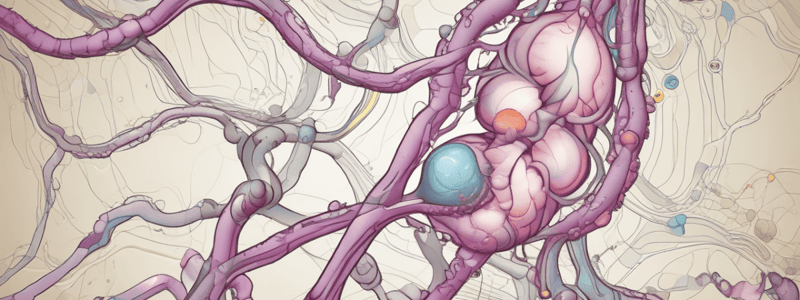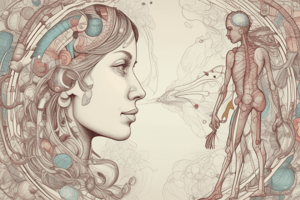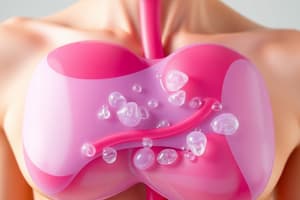Podcast
Questions and Answers
What is the composition of antidiuretic hormone (ADH)?
What is the composition of antidiuretic hormone (ADH)?
- A small peptide hormone made up of amino acids (correct)
- A nucleic acid
- A complex carbohydrate
- A lipid molecule
What is the primary effect of ADH on blood vessels?
What is the primary effect of ADH on blood vessels?
- Increased blood flow and decreased pressure
- Decreased blood flow and increased pressure
- Vasoconstriction and increased resistance (correct)
- Vasodilation and decreased resistance
What is the formula that relates to blood pressure?
What is the formula that relates to blood pressure?
- Delta P = Q/R
- Delta P = Q - R
- Delta P = Q × R (correct)
- Delta P = Q + R
What is the effect of increased resistance on blood pressure?
What is the effect of increased resistance on blood pressure?
What is the other organ that ADH acts on besides blood vessels?
What is the other organ that ADH acts on besides blood vessels?
What is the net effect of ADH on blood pressure?
What is the net effect of ADH on blood pressure?
What is the term for the constriction of blood vessels?
What is the term for the constriction of blood vessels?
What is the correct definition of flow (Q)?
What is the correct definition of flow (Q)?
What is the primary function of ADH in the body?
What is the primary function of ADH in the body?
What happens to the aquaporin vesicle when ADH is present?
What happens to the aquaporin vesicle when ADH is present?
What is the result of ADH allowing water to enter the blood?
What is the result of ADH allowing water to enter the blood?
What is the term for the water-channel forming proteins?
What is the term for the water-channel forming proteins?
What is the effect of ADH on the collecting duct cell?
What is the effect of ADH on the collecting duct cell?
What is the primary effect of increased reabsorption of water in the kidneys?
What is the primary effect of increased reabsorption of water in the kidneys?
What happens to the stroke volume of the heart as a result of ADH?
What happens to the stroke volume of the heart as a result of ADH?
Where does ADH have its effect in the nephron?
Where does ADH have its effect in the nephron?
What is the ultimate result of ADH's effect on the blood?
What is the ultimate result of ADH's effect on the blood?
Where does ADH float through to have its effect?
Where does ADH float through to have its effect?
What is the concentration of the collecting duct in terms of milliOsms?
What is the concentration of the collecting duct in terms of milliOsms?
What is the function of aquaporin in the collecting duct cells?
What is the function of aquaporin in the collecting duct cells?
Why is the saltiness of the collecting duct important?
Why is the saltiness of the collecting duct important?
What happens to water when it reaches the areas without aquaporin channels?
What happens to water when it reaches the areas without aquaporin channels?
What is the direction of urine flow in the collecting duct?
What is the direction of urine flow in the collecting duct?
What is the effect of ADH on the collecting duct?
What is the effect of ADH on the collecting duct?
What is the relationship between the concentration of the collecting duct and its location?
What is the relationship between the concentration of the collecting duct and its location?
What is the main purpose of the nephron's structure?
What is the main purpose of the nephron's structure?
Flashcards are hidden until you start studying
Study Notes
Antidiuretic Hormone (ADH)
- ADH is a small peptide hormone made up of amino acids
- It is secreted into the blood vessels of the posterior pituitary and travels to different parts of the body
Effects of ADH on Blood Pressure
- ADH increases blood pressure by targeting smooth muscle in arterial vessels, causing vasoconstriction
- Vasoconstriction increases resistance, which in turn increases blood pressure according to the formula: ΔP = Q × R (change in pressure equals flow rate times resistance)
- Increased resistance and blood pressure are directly related
Effects of ADH on the Kidney
- ADH acts on the kidney, specifically on the collecting duct cells, to increase reabsorption of water
- This increases stroke volume, which in turn increases blood pressure
- ADH affects the kidney by causing the insertion of aquaporin channels into the collecting duct cells, allowing water to flow from the urine into the blood
Mechanism of ADH in the Kidney
- ADH causes aquaporin vesicles to merge with the cell wall, creating channels for water to flow across
- Water then flows from the urine into the bloodstream, increasing blood volume and subsequently stroke volume
- The increase in stroke volume leads to an increase in blood pressure
Studying That Suits You
Use AI to generate personalized quizzes and flashcards to suit your learning preferences.



